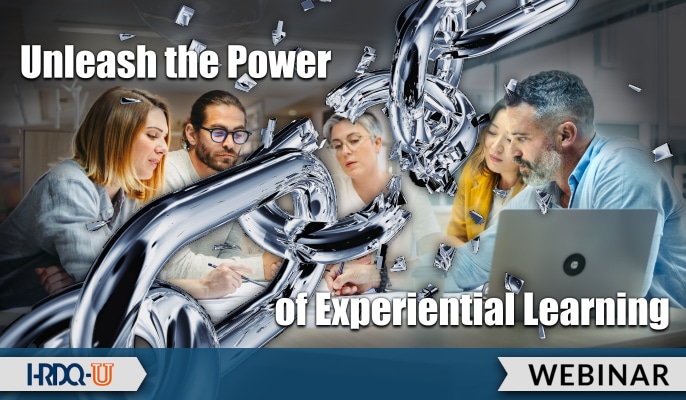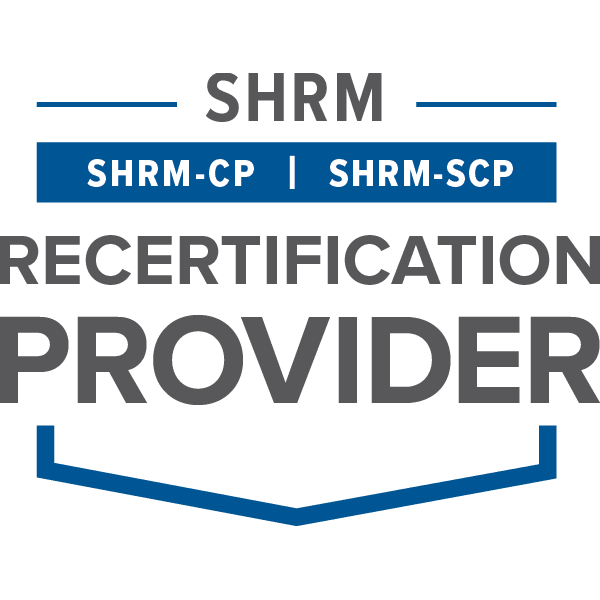- 827 Lincoln Ave. #B-10 West Chester, PA 19380
- support@hrdq.com
- +1-610-279-2002
Quick Links
Menu
Featured Topics
Menu
Total Results
We could not find what you're looking for. Please try again.No Record Found

How can you capitalize on the power of experiential learning to drive behavioral change in your organization? What makes an activity an effective experiential learning activity? What’s the difference between a game that simply entertains and an experiential activity that leads to thought-provoking reflection and lasting behavioral change in the workplace?
In this interactive and engaging webinar, you will have the opportunity to learn more about the design and facilitation of sophisticated experiential learning activities that stimulate change and reflect upon the steps that you can personally take to deliver more meaningful workshops.
We will discuss and consider the principles of experiential learning that you can use to encourage your participants to take responsibility for their own development, think critically about their individual and team behavior, develop strategies for improving performance, and, ultimately, drive behavioral change in your organization.
If you are interested in using experiential learning to develop talent in areas such as leadership, change, teamwork, communication, negotiation, or problem-solving, then this is the session for you.


Jamie Thompson helps facilitators unleash the power of experiential learning.
Known for his engaging and empowering style and creative approach, over 1000 facilitators and trainers from 37 different countries have attended his train the trainer programs, and they leave his training programs with the tools, skills, and confidence to deliver powerful experiential learning activities.
Jamie has plenty of experience to tap into and share. The MTa experiential learning kits that he and his team have developed are now used in over 100 countries by many of the world’s leading organizations. He has personally designed activities and facilitator training programs for high-profile companies such as Emirates Airlines, Saudi Aramco, Nissan, and Verizon USA. He enjoys sharing his learning and has spoken at conferences throughout the world, including ATD USA, ATD Taiwan, and CIPD London.
Jamie’s creative approach is combined with a rigorous corporate and academic background. He started his career with Deloitte’s Strategy Consulting Practice in 2003 and joined MTa in 2008. In 2016, he won the EU Excellence in Human Resources Scholarship from Leeds University Business School to further his study of organizational behavior and organizational psychology. He’s stayed on at the Business School as a Leader in Residence and guest lecturer and retains an academic interest in team development and facilitation.
Develop leaders.
Drive innovation.
Improve communication.
Learn more at experientiallearning.org

Training Tools for Developing Great People Skills
This event is sponsored by HRDQ. For 45 years HRDQ has provided research-based, off-the-shelf soft-skills training resources for classroom, virtual, and online training. From assessments and workshops to experiential hands-on games, HRDQ helps organizations improve performance, increase job satisfaction, and more.
Learn more at HRDQstore.com

“This was a very informative training, and it makes you think about working with peers as well as individuals on my caseload.”
Roberta B.
Program Manager
Louisiana Department of Health

“The Reflecting concept was helpful and will be useful in the future.”
Christopher H.
Consultant
Covestro LLC

“Jamie Thompson delivered a thought-provoking session on experiential learning that was engaging and meaningful.”
Barbara S.
Program Management Specialist
University of Maryland Baltimore County

Sign up to be notified of upcoming live webinars, in-depth workshops, podcasts, blog posts, promotions and much more. Stay ahead of the curve and subscribe for FREE today!
5 Responses
Question: Can you tell us about a success story?
Answer: So, let’s say yesterday, I was working with a crew of 40 people from a government organization, who are based in London. And they were having real challenges about how they work in silos that have been working. So it’s been difficult for them to, to interact and an activity, which can represented that situation. We should have an opportunity to collaborate across silos if they wanted to be more comfortable working in silos state, that will pan out. So you run the activity, Hands, see, I didn’t know it, was coming out of, participants, knew, knew all coming. For me, after about 45 minutes, when the CEO said, look, guys, what’s going on here, We’re not talking to them, not collaborating, this is a reflection of our organizational culture. And I think this is what’s gonna on at the moment, and then there were the nods around the room, the, participants. Yeah, I get it how interesting, wow, you know, working so hard individually. But, we’re not working together effectively – why is that? Then you leave the activity behind and you have a discussion that the activity simply catalyst for bringing that issue onto the table in the right kind of non-aggressive way, which is going to elicit discussions. I think anytime you you bring the conversations to the table it’s a success, and … nice things happen … very quickly, it starts those powerful, useful thought-provoking conversations that allows us to take the organization forward.
Question: What’s the biggest mistake trainers meet?
Answer: So, just thinking about all mistakes I’ve made, Amy, it’s doing your activity, which is too difficult. So, it’s quite. It’s seem to be some paper often, seem quite easy enough to do them individually. It’s the complexity of working together, which causes problems, and so it has a facilitator, you just have to easy, super easy to recover from. What was it enabled? You guys say, successful, loves talking about that. If you do an action because she’s too difficult than people disengage, they get defensive, they start to blame next to the TD. They push back, and they feel cheated. So, so that’s a big mistake, you know, to voting, sufficient time to review, Facilitates, often worry that participants will only enjoy playing the games. And that’s not my experience. Participants actually really value learning about themselves, learning about how they can have a less stressful time, learning about how I can track my colleagues better. You get at learning through really robust review processes and getting people to spend time on review processes. So I think he’s not having confidence to really help people learn and spend too much time trying to entertain the workflow that I think people quitting importer. They really value is development. If they don’t well, it may be Few organizations say, hey, pay attention to that.
Question: What would you suggest anyone who wants to get started?
Answer: So when I was taking over MTA many, many years ago, I was practicing Medical Scout Group, practicing their skills and … semi organized universities. Senior organizations that can benefit from a high quality people development. So you need to find yourself a task. Actually, go onto our website. We’ve got three different download or tasks for free. Which are available, Which you can do is readily available materials, and then you’ve got the slides, You’ve got the breach Gulf facilitator knows you call the …, find people with practice, and then do an experiential, yep, So how do you experience Daniel? Reflect on, and think how I think, what you could do to enable you to be successful, and they’ll take you forward.
Question: How can people use experiential learning, but in a virtual setting? Do you have any tips, recommendations, or any commentary on that?
Answer: So whenever it was March 4 to 2020 people from all around the world, getting in touch asking me, how, How it, Because Larry Experiential learning online. So last couple of years, I’ve actually developed a collaborative online platform where everybody joins us, zoom in a virtual space where they can manipulate data, they meditate shapes and objects. They manipulate information and collaboratively And to create the same really rich social team, individual, cognitive processes that you would get in the physical space. Put in the online payment, online space, because everybody’s doing a task that requires everybody to be involved. People can’t just say too much happened is an issue. They have to be involved and Because of that and then you can have the same kind of conversations that you would have after, after a physical experiential session. So the principles the same: You just need a different tool set and that’s the kind of tools that I’ve been developing over the last couple of years.
Question: How do you convince leadership of the importance of experiential learning, and this same age, when there’s so much emphasis on the broad reach and low cost of learning online?
Answer: I’d say, what if you can do it through with them, because that’s when they feel the real power of it. Me show you prioritizing it as well. So, there are times when experiential learning is truly the best and most cost efficient solution. When you want to develop teams, when you want to develop leaders, when you’re trying to develop qualities of the mind. And so, it’s often a good idea to us, they didn’t see new people, what they really want from their people. And if you do ask them really quite surprised, if it is, we want to know more. I suspect they’ll say things like lunch more crazy, or more irritated when a more collaborative. More flexible, adaptable, resilient. They are all qualities, because you have individual teams, the culture. And you develop that by getting people in a room together or indeed online UTC’s priest goes online, and getting them to reflect and think, and engage, and that’s going to make a big impact. But it is more expensive. So, I think it’s very much return on investment question, but also cessation question as well, and to your senior people on that side. And then, once they will say, felt it, no matter how valuable attrition is much easier and much easier to sell.